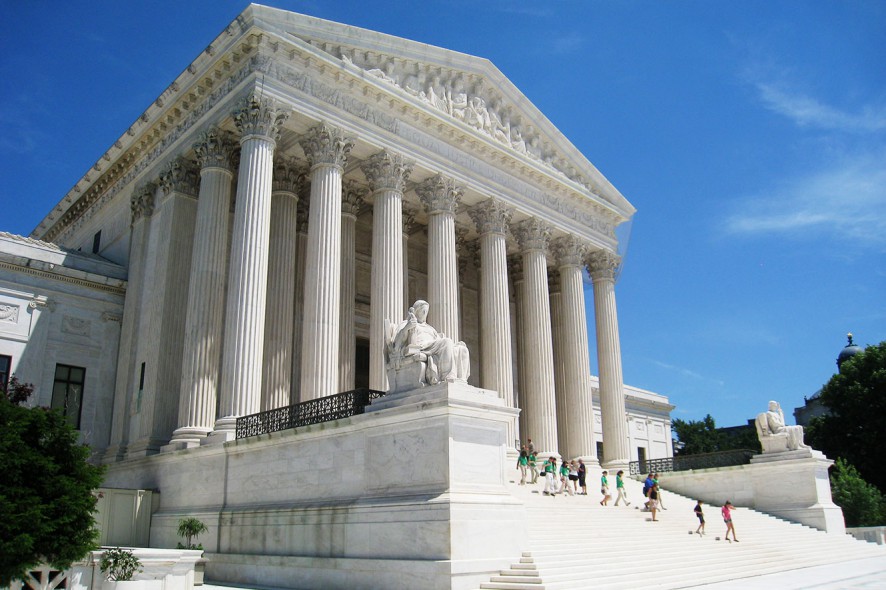Supreme Court of The United States: In a significant decision, the Court by a ratio of 6:3, declined to review petitions challenging Pennsylvania’s “mail-in ballots” policy. The lawsuits that the court turned down concerned Republican Party’s bids to invalidate Pennsylvania’s extended mail ballot due date. It was claimed that Pennsylvania’s policy of ‘accepting timely sent ballots that arrived up to three days after Election Day was illegal’.
Pennsylvania has a long history of limiting the use of mail-in ballots. However in October 2019, the Pennsylvania Legislature overhauled its election laws and gave all voters the option of voting by mail, and it extended the deadline for officials to receive mail ballots by several days to 8 p.m. on Election Day. Then, in response to COVID–19, the legislature again amended the law but decided not to extend the receipt deadline further. Displeased with that decision, the Pennsylvania Democratic Party sued in state court. It argued that the court could extend the deadline through a vague clause in the State Constitution providing, in relevant part, that “elections shall be free and equal.” [Art. I,§5]. The Pennsylvania Supreme Court agreed and held that the “free and equal” provision enabled the court to extend the deadline three days to accommodate concerns about postal delays.
Although the SCOTUS majority refused to entertain any more petitions, however, Clarence Thomas, Samuel Alito and Neil Gorsuch, JJ., dissented from the majority. Clarence Thomas, J., stated that it is the Federal Constitution, not state constitutions, which gives state legislatures the authority to regulate Federal elections; the Republicans had a strong argument that the Pennsylvania Supreme Court’s decision violated the Constitution by overriding “the clearly expressed intent of the legislature”. He further observed that it is fortunate that the Pennsylvania Supreme Court’s decision to change the receipt deadline for mail-in ballots did not appear to have changed the outcome in any federal election, but he also pointed out that, “We may not be so lucky in the future. Indeed, a separate decision by the Pennsylvania Supreme Court may have already altered an election result. A different petition argues that after Election Day the Pennsylvania Supreme Court nullified the legislative requirement that voters write the date on mail-in ballots”. Thomas, J., also pointed out that in 2018 the percentage of mail-in ballots cast was at 4%, but the legislature dramatically expanded the process in 2019, thereby increasing the mail-in ballots cast in 2020 to 38%. According to Thomas, J., this expansion impeded post election judicial review because litigation about mail-in ballots is substantially more complicated. “The Pennsylvania Supreme Court issued its decision about six weeks before the election, leaving little time for review in this Court. And there is a reasonable expectation that these petitioners—the State Republican Party and legislators—will again confront non legislative officials altering election rules. … we failed to settle this dispute before the election, and thus provide clear rules. Now we again fail to provide clear rules for future elections. The decision to leave election law hidden beneath a shroud of doubt is baffling. By doing nothing, we invite further confusion and erosion of voter confidence”.
Samuel Alito, J., (for himself and Neil Gorsuch, J.,) observed that the Republican petitions present an important and recurring constitutional question, that whether the Elections or Electors Clauses of the United States Constitution Art. I, §4, cl. 1; Art. II, §1, cl. 2, are violated when a state court holds that a state constitutional provision overrides a state statute governing the manner in which a federal election is to be conducted. Noting that since this constitutional issue has baffled the lower courts time and again, therefore a SCOTUS review would have been helpful to provide a clear path for them to follow in case of future disputes of such nature. Moreover, now, that the Presidential Election is over, there is no reason for refusing to decide the important question that these cases pose. “The provisions of the Federal Constitution conferring on state legislatures, not state courts, the authority to make rules governing federal elections would be meaningless if a state court could override the rules adopted by the legislature simply by claiming that a state constitutional provision gave the courts the authority to make whatever rules it thought appropriate for the conduct of a fair election.” – Bush v. Palm Beach County Canvassing Bd., 2000 SCC OnLine US SC 81.[Republican Party of Pennsylvania v. Veronica Degraffenreid (Nos. 20–542), 592 U. S. (2021), decided on 22-02-2021]
Sucheta Sarkar, Editorial Assistant has put this story together.







